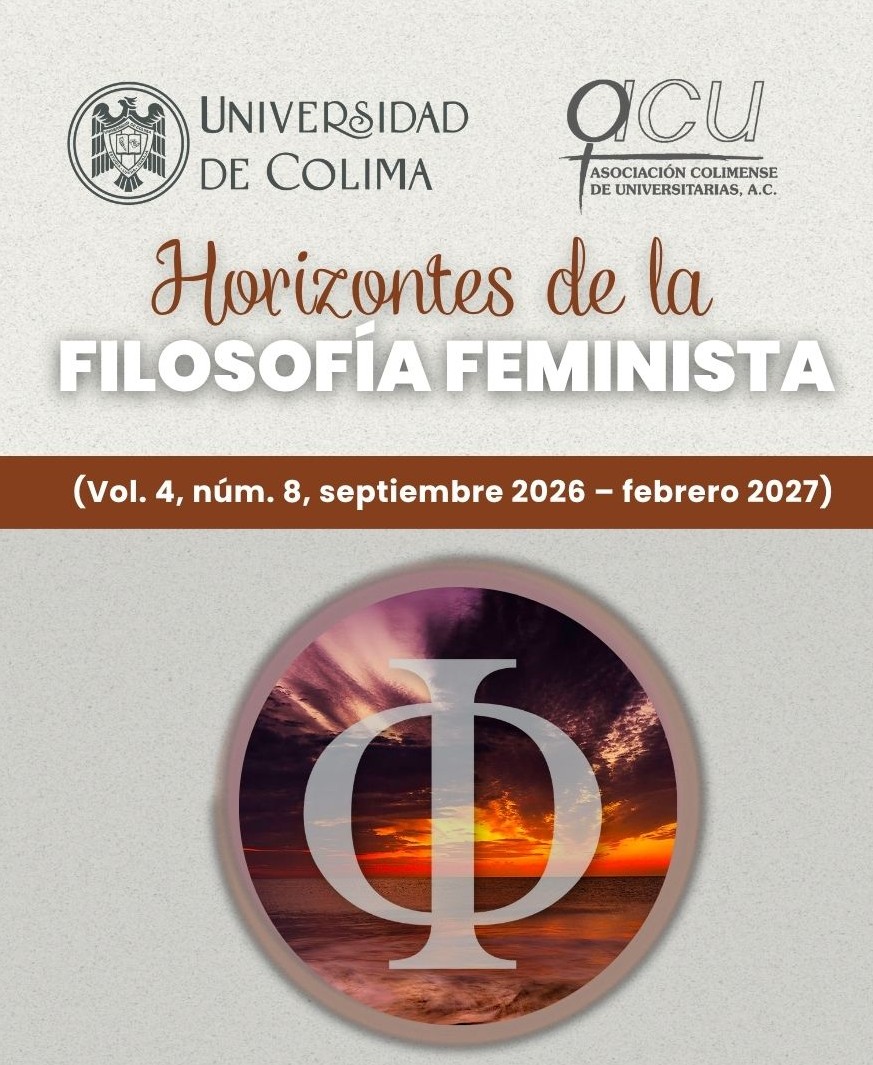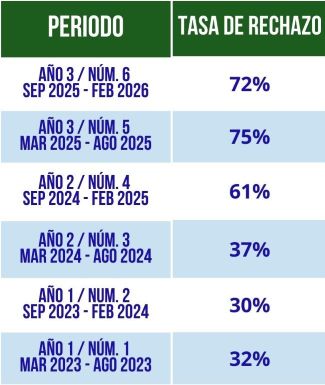Código de ética
Código de Ética y Buenas Prácticas Editoriales
La revista GénEroos se compromete con la integridad académica y la excelencia editorial. Su misión es fomentar un espacio plural para el análisis, el debate y la difusión de estudios de género desde múltiples disciplinas, promoviendo la equidad y la diversidad.
1. Responsabilidades de los autores/as
- Garantizar la originalidad de los trabajos, evitando plagio o autoplagio, respetando las normas de citación y los parámetros exigidos por la revista GénEroos, con el fin de reconocer el trabajo de otros/as autores/as citados, garantizar la originalidad de las hipótesis planteadas y la veracidad de los datos proporcionados.
- Respetar las normas de citación y referenciar adecuadamente todas las fuentes utilizadas, proporcionando siempre la correcta indicación de los aportes mencionados en el artículo. Se sugiere incluir el número de página en citas indirectas que sean muy cercanas a la idea original, siguiendo las buenas prácticas de APA 7, para favorecer la precisión y claridad académica.
- No presentar trabajos múltiples, repetitivos o simultáneos sobre las temáticas publicadas por GénEroos u otras revistas, ya que esto atenta flagrantemente sobre la originalidad del trabajo y puede dar pie a una alteración de resultados por parte de las y los autores.
- Asegurar la veracidad en el desarrollo de la investigación, incluyendo bases de datos, referencias teóricas y datos empíricos, de manera que las hipótesis planteadas puedan verificarse científicamente.
- Declarar explícitamente la existencia o ausencia de conflictos de interés que puedan haber influido en los resultados obtenidos o en las interpretaciones propuestas, así como indicar cualquier financiamiento proveniente de agencias y/o proyectos del que surja el artículo presentado a la revista GénEroos.
- No enviar trabajos previamente publicados o en proceso de revisión en otros espacios editoriales.
- Proporcionar siempre la correcta indicación de las fuentes y de los aportes mencionados en el artículo, garantizando la transparencia y el reconocimiento de los trabajos consultados.
- Referenciar de manera ineludible a todas las personas que hayan realizado una contribución científica e intelectual significativa en la conceptualización, planificación, interpretación de resultados y redacción del manuscrito
- Sustentar la jerarquización y el orden de autoría conforme al nivel real de responsabilidad, contribución e implicación de cada participante en el desarrollo de la investigación, evitando autorías honorarias o la exclusión de colaboradores significativos.
- Advertir a los editores/as si partes sustanciales del trabajo ya han sido publicadas o se encuentran bajo revisión en otras publicaciones.
- Aceptar la responsabilidad de lo escrito en el trabajo científico y comprometerse a realizar una revisión de la literatura más actual y relevante del tema analizado, considerando de manera plural las diferentes corrientes del conocimiento.
2. Responsabilidades de los revisores/as
- Evaluar los manuscritos de manera objetiva, confidencial y sin emitir juicios personales sobre los autores/as.
- Aceptar la revisión únicamente si no existe conflicto de interés, y mantener la confidencialidad de la información revisada, la cual no puede ser utilizada para fines personales.
- Considerar cada manuscrito como un documento confidencial, que no debe discutirse con otras personas sin el consentimiento expreso de los editores/as y los autores/as.
- Entregar informes críticos completos y justificados,con referencias adecuadas según el protocolo de revisiones de la revista, especialmente en casos de rechazo.
- Señalar similitudes o solapamientos con otros trabajos publicados, así como indicar con precisión las referencias bibliográficas de obras fundamentales que puedan haber sido omitidas por el autor/a..
- Cumplir con los plazos de revisión establecidos y comprometerse a evaluar los trabajos en el menor tiempo posible, respetando los límites de custodia de los manuscritos en espera de dictamen.
- Notificar de forma inmediata a la edición de la revista si no se sienten competentes en la temática asignada o si no pueden concluir la evaluación en el tiempo programado por causas de fuerza mayor.
- Desempeñar su labor de manera objetiva y profesional, proporcionando razones suficientes para sus valoraciones y evitando juicios personales sobre los autores/as de las contribuciones.
3. Responsabilidades de los editores/as
- Supervisar el proceso de revisión por pares y garantizar la selección de revisores/as calificados y especialistas científicamente capaces de emitir una apreciación crítica y experta del trabajo.
- Evaluar los artículos únicamente en función de su mérito científico, sin discriminación por raza, credo, tendencia ideológica, género, orientación sexual, religión, origen étnico o nacionalidad.
- Autorizar o denegar la publicación de los trabajos manteniendo la confidencialidad de los manuscritos.
- Verificar la originalidad de los manuscritos mediante el uso de software antiplagio (como Turnitin), comunicar a los autores/as cualquier coincidencia relevante detectada y solicitar las aclaraciones o correcciones necesarias, manteniendo en todo momento la confidencialidad de los informes generados. Asimismo, seguir los lineamientos del Committee on Publication Ethics (COPE) para la gestión de posibles malas prácticas.
- No utilizar en investigaciones propias contenidos de los artículos enviados para su publicación sin el consentimiento por escrito del autor/a.
- Solicitar, si es necesario, los datos o fuentes en que se basa la investigación.
- Gestionar los tiempos de revisión y publicación en colaboración con la coordinación editorial y los autores/as, asegurando el cumplimiento de los plazos establecidos y la rápida difusión de los resultados.
- Iniciar un procedimiento de investigación y reclamación de autoría en caso de identificarse plagio y/o alguna mala práctica de investigación en un artículo ya publicado, en apego al Código de Ética de la revista y siguiendo los lineamientos del Committee on Publication Ethics (COPE). Este procedimiento podrá derivar, según la gravedad del caso, en correcciones, notas editoriales o la retractación del artículo.
4. Prácticas no aceptadas y consecuencias
- Plagio o autoplagio, incluyendo la apropiación indebida de ideas, datos o textos sin la referencia correspondiente.
- Se entiende por autoplagio la reutilización de textos propios previamente publicados sin citar la fuente, presentándolos como inéditos. Esta práctica no es aceptada en la revista.
- La autocita, en cambio, es la referencia explícita a trabajos previos del mismo autor/a. La revista permite la autocita en un porcentaje máximo del 10% al 15% del total de las referencias bibliográficas del manuscrito, siempre que se realice de manera transparente y justificada.
- Publicación simultánea, múltiple o redundante en otras revistas o sobre las mismas temáticas ya publicadas en GénEroos.
- Manipulación, falsificación o invención de datos, referencias teóricas o resultados empíricos.
- Divulgación indebida de información confidencial contenida en los manuscritos durante el proceso de dictamen.
- Juicios personales o discriminación hacia autores/as, basados en raza, credo, ideología, género, orientación sexual, religión, origen étnico o nacionalidad.
- Autorías honorarias o exclusión de colaboradores significativos, que distorsionen la verdadera participación en la investigación.
- Incumplimiento de los tiempos de entrega en el proceso de dictamen o publicación, sin notificación previa a la coordinación editorial.
- Uso indebido de contenidos de los artículos enviados para investigaciones propias de editores/as o revisores/as sin consentimiento por escrito del autor/a.
- Conflictos de interés no declarados, que puedan influir en los resultados obtenidos o en las interpretaciones propuestas.
Consecuencias
El incumplimiento de estas normas puede derivar en:
- Rechazo inmediato del manuscrito.
- Retractación de un artículo ya publicado.
- Inicio de procedimientos de reclamación de autoría.
- Notificación a las instituciones correspondientes para que tomen las medidas disciplinarias pertinentes.
Todas estas acciones se realizan en apego al Código de Ética de la revista GénEroos y siguiendo los lineamientos y casos expuestos por el Committee on Publication Ethics (COPE).







